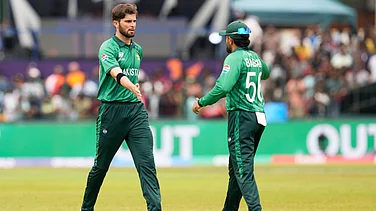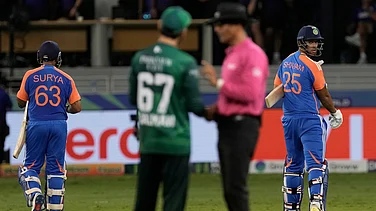Every World Cup throws up its own star; an individual who does more than any other to take his team to prominence. Zinedine Zidane was the man in France four years ago; Brazil's Romario was on top in the United States in 1994. Yet while this World Cup has been hailed as entertaining and exciting, it has been lacking the individualistic flair of previous tournaments. But that's not to say no one has stood out.
Established stars such as Zidane and Juan Veron may well have struggled, and ultimately failed. But a new breed has come forward, as you would expect at a gathering of the game's greatest exponents. And although no one player has dominated Korea/Japan 2002, a handful have proven or improved their value with impressive performances that have had the world talking.
Before the tournament kicked off, hardly anyone outside of Germany knew Miroslav Klose, a 24-year-old forward called into the squad by Rudi Voeller just ahead of the finals. By the end of Germany's first game, Klose's name was on everyone's lips, scoring a hat-trick of headers against Saudi Arabia.
He proved it was no fluke several days later, scoring again with his head against the Republic of Ireland and, in the final group match against Cameroon, he was on target once more, claiming his fifth goal in three games to lead the early Golden Boot standings.
The Kaiserslautern forward came into the World Cup without much of a reputation but with plenty of pedigree. Born in Poland of German parents, Klose has the genes to succeed. His father played in the French second division with Auxerre while his mother was an international handball player. He moved to Germany when he was eight years old and is now being talked about as a successor to Gert Muller and Jurgen Klinsmann, arguably the nation's greatest-ever forwards.
Klose's record of 13 goals in 15 games for Germany is astounding but if he wants to capture the position of leading scorer at this World Cup, he will have to surpass one of the greatest talents of the last decade: Ronaldo. The Brazilian's name is hardly new to the upper echelon of world football. He has twice been named World Player of the Year, has played with the biggest clubs on the planet and was in the World Cup-winning squad in the US as a 17-year-old in 1994.
But this year's Ronaldo, the joint leading goalscorer with Klose, is a new, reborn Ronaldo. Since the controversy and disappointment of Brazil's defeat in the final against France four years ago, the 25-year-old has been forced to completely rebuild his career. Two serious knee operations since joining Inter Milan in 1999 have blighted his progress and that he is back at all for Brazil is remarkable in itself.
Which makes the fact that he has scored five times in Brazil's opening four matches—hitting the back of the net in every game—all the more remarkable. And while he may still be some way short of his ultimate peak, Ronaldo at 75 per cent is still better than many others operating above capacity. Ronaldo's power, skill and sheer presence intimidate defenders and back lines regularly capitulate to his awesome striking skill. His goal against Belgium in the second round was one of quality; his work rate is immense, his influence immeasurable. If Brazil go on to win the World Cup, it will be in no small part due to Ronaldo's return.
As Brazil look to return to the top, one nation seeking a place at the summit at their first World Cup is the African team Senegal and the form of one man in particular has caught the eye. Brash and brazen with a reputation as a hell-raiser off the field, forward El Hadji Diouf is a handful on the pitch as well. The man with the short-cropped bleached-blonde hairstyle was anything but an unknown quantity coming into the World Cup, having picked up the African Player of the Year award before the tournament kicked off.He claimed the title after his goal-scoring exploits qualified Senegal for Korea/Japan 2002 and also took them to the final of the African Cup of Nations in Mali in February.
But the 21-year-old had never shown his worth against top-class opposition. Any doubts over his ability, though, have been quickly dispelled with English Premier League club Liverpool signing up the pacy, powerful and tricky striker in an attempt to find the perfect foil for England star Michael Owen. After his display against Sweden, when he tormented the Scandinavians, Diouf's future looks bright indeed.
Not all of the World Cup's stars have come in attack. In the midfield, Japan's Junichi Inamoto has shone and at the back Rio Ferdinand of England has been in fine form. For Inamoto, the World Cup has been a vindication of his
talent despite spending a year in the reserves at the London club Arsenal, where he has been labelled as nothing more than a marketing ruse. Unfortunately it is a tag which has been stuck on numerous Asian players by lazy journalists looking for an easy story. In truth, Inamoto is a talented young player and his year in England has developed his skills. The World Cup has given him the perfect stage on which to prove himself and, in Japan's opening two games, he duly responded. His showing was such that clubs from all over Europe are now flocking to gain his signature after Arsenal decided to release him this summer. Bidding for the combative midfielder could start as high as $10 million.
That, though, is nothing compared to the value now placed on the head of Ferdinand. When he joined Leeds United from Westham United for $25 million, he was the world's most expensive defender. If he moves on after his remarkable performances during this World Cup, Leeds are sure to make a huge profit.
Ferdinand, playing in his second World Cup, had a pre-tournament reputation as a work-in-progress, a player who had the potential but had yet to focus fully on the task at hand. Any doubts over his ability to concentrate on the game have now been banished after several monumental performances, especially in England's 1-0 win over Argentina. Ferdinand, like all of the above, looks to have come of age. In this most open-ended World Cups of all, the new stars are burning bright.
The Rainbow Warriors
We were expecting the born-again ebullience of Ronaldo. But World Cup 2002 has also been a cauldron of hot, young talent and all continents find face in the new who's who of soccer.

The Rainbow Warriors
The Rainbow Warriors
Published At:
- Previous Story
 Pakistan Vs USA Preview, ICC T20 World Cup 2026: Unpredictable PAK Look To Avoid Upset Against Determined USA
Pakistan Vs USA Preview, ICC T20 World Cup 2026: Unpredictable PAK Look To Avoid Upset Against Determined USA - Next Story
MOST POPULAR
WATCH
MORE FROM THE AUTHOR
PHOTOS
×





















